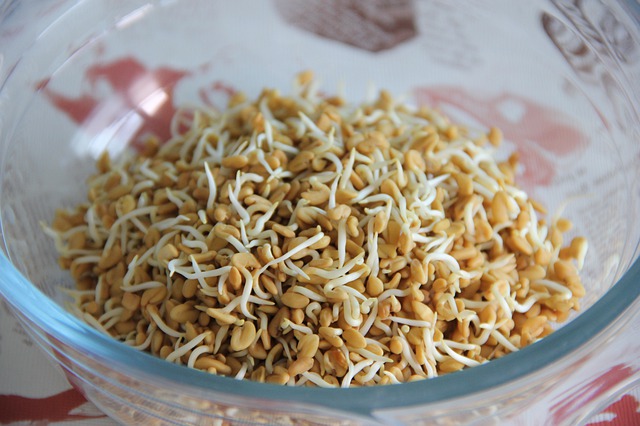Fenugreek is an herb long used in alternative medicine. It’s a common ingredient in Indian dishes and often taken as a supplement.
This herb may have numerous health benefits. This article explains everything you need to know about fenugreek, including its benefits, side effects, and uses.
This herb may have numerous health benefits. This article explains everything you need to know about fenugreek, including its benefits, side effects, and uses.
What is fenugreek?
Fenugreek is an interesting herb with diverse uses and many potential health benefits.
Fenugreek (Trigonella foenum-graecum) is a plant that stands around 2–3 feet (60–90 cm) tall. It has green leaves, small white flowers, and pods that contain small, golden-brown seeds.
For thousands of years, fenugreek has been used in alternative and Chinese medicine to treat skin conditions and many other diseases.
Recently, it has become a common household spice and thickening agent. It can also be found in products, such as soap and shampoo.
Fenugreek seeds and powder are also used in many Indian dishes for their nutritional profile and slightly sweet, nutty taste.
Fenugreek (Trigonella foenum-graecum) is a legume and it has been used as a spice throughout the world to enhance the sensory quality of foods.
It is known for its medicinal qualities such as antidiabetic, anticarcinogenic, hypocholesterolemic, antioxidant, and immunological activities.
Besides its medicinal value, it is also used as a part of various food product developments as a food stabilizer, adhesive, and emulsifying agent.
Besides its medicinal value, it is also used as a part of various food product developments as a food stabilizer, adhesive, and emulsifying agent.
More importantly, it is used for the development of healthy and nutritious extruded and bakery products. The present paper reviews about nutraceutical properties of fenugreek and its utilization in various product developments.
Nutrition fact of fenugreek-
Fenugreek seeds have a healthy nutritional profile, containing a good amount of fiber and minerals, including iron and magnesium.
*Per cent Daily Values are based on a 2,000 calorie diet. Your daily values may be higher or lower depending on your calorie needs.
Nutrition Facts of Fenugreek seed
Amount Per 100 grams % Daily Value*
|
| Calories 323 |
| Total Fat 6 g | 9% |
| Saturated fat 1.5 g | 7% |
| Cholesterol 0 mg | 0% |
| Sodium 67 mg | 2% |
| Potassium 770 mg | 22% |
| Total Carbohydrate 58 g | 19% |
| Dietary fiber 25 g | 100% |
| Protein 23 g | 46% |
| Vitamin A | 1% | Vitamin C | 5% |
| Calcium | 17% | Iron | 186% |
| Vitamin D | 0% | Vitamin B-6 | 30% |
| Vitamin B-12 | 0% | Magnesium | 47% |
*Per cent Daily Values are based on a 2,000 calorie diet. Your daily values may be higher or lower depending on your calorie needs.
Fenugreek benefit, Uses, and Effectiveness?
Possibly Effective for -
Diabetes. Some research shows that consuming fenugreek seed, mixed with food during a meal, lowers blood sugar levels after the meal in people with type 2 diabetes
.
However, while taking 5-50 grams of fenugreek seed once or twice daily seems to work, lower doses of 2.5 grams don't seem to work.
In people with type 1 diabetes, taking 50 grams of fenugreek seed powder twice daily seems to reduce the amount of sugar in the urine.
Painful menstrual periods (dysmenorrhea). Taking 1800-2700 mg of fenugreek seed powder three times daily for the first 3 days of a menstrual period followed by 900 mg three times daily for the remainder of two menstrual cycles reduces pain in women with painful menstrual periods. The need for painkillers was also reduced.
Insufficient Evidence for -
Exercise performance. There are conflicting results regarding the effects of fenugreek on exercise performance. Some early research shows that taking 500 mg of fenugreek supplement (Indus Biotech, India)- for 8 weeks decreases body fat and increases testosterone levels, but does not change muscle strength or endurance in young men.
- However, other research shows that taking 500 mg of fenugreek extract (Torabolic, Indus Biotech) daily for 8 weeks reduces body fat and increases leg and bench press performance in a similar group of young men.
- Also, other early research shows that taking 300 mg fenugreek chemicals (Fenu-FG, Indus Biotech Private Limited, Pune, India) each day might help men do more bench press exercises. But it does not seem to help them lift more weight or do more leg press exercises.
Heartburn. Research shows that taking a specific fenugreek product (FenuLife, Frutarom Belgium) before the two biggest meals of the day reduces symptoms of heartburn.
High cholesterol. There is conflicting evidence about the effects of fenugreek on cholesterol levels. Early research shows that taking fenugreek seed reduces total and low-density lipoprotein (LDL or "bad") cholesterol.
But the effects of fenugreek seed on high-density lipoprotein (HDL or "good") cholesterol and triglycerides are inconsistent.
Breast milk production. There are some reports that taking fenugreek capsules or drinking fenugreek tea beginning shortly after giving birth can increase milk production in breastfeeding women.
Fenugreek seems to help the most when it is started a day or two after giving birth. But not all research agrees. And some research shows that taking fenugreek is less beneficial than taking Indian borage or palm date.
Male infertility. Early research suggests that taking fenugreek seed oil drops by mouth three times daily for 4 months improves sperm count in men with a low concentration of sperm. But taking the other parts of the fenugreek seed does not seem to have this effect.
Weight loss. Early research shows that a fenugreek seed extract can reduce daily fat intake in overweight men when taken by mouth at a dose of 392 mg three times daily for 2-6 weeks.
But a lower dose does not appear to have this effect. Neither does affect weight, appetite, or fullness. Adding 4 or 8 grams of fenugreek fiber to breakfast seems to increase feelings of fullness and reduce hunger at lunchtime. But it's not clear if this increases weight loss.
Parkinson's disease. Research suggests that taking fenugreek seed extract (Indus Biotech Private Limited, Pune) twice daily for 6 months does not improve symptoms in people with Parkinson's disease.
Ovarian cysts (polycystic ovary syndrome). There are conflicting results regarding the effect of fenugreek for ovarian cysts.
Research suggests that taking fenugreek seed extract (Goldarou Pharmaceutical Co. Isfahan Iran) daily for 8 weeks does not improve symptoms for women with ovarian cysts.
However, other early research suggests that taking 1000 mg of a specific type of fenugreek seed extract (Furocyst, Cepham Inc., Piscataway, NJ) each day might reduce the size of the ovarian cysts and help to regulate the length of the menstrual cycle and time between having a period.
Doses of fenugreek
The following doses have been studied in scientific research:
By mouth:
For diabetes: 5-100 grams of powdered fenugreek seed added to one or two meals daily for 4 days to 3 years has been used. A dose of 1 grams daily of an extract of fenugreek seeds has been used.
For painful menstruation (dysmenorrhea): 1800-2700 mg of fenugreek seed powder three times daily for the first 3 days of menstruation, followed by 900 mg three times daily for the remainder of two menstrual cycles, has been used.
For increasing interest in sex: 600 mg of fenugreek seed extract (Libifem, Gencor Pacific Ltd.) each day for two menstrual cycles.
For improving sexual performance: 600 mg of fenugreek seed extract (Testofen, Gencor Pacific Ltd) each day alone or with magnesium 34 mg, zinc 30 mg, and vitamin B6 10 mg, for 6-12 weeks has been used.
Side Effects and Safety of Fenugreek
Fenugreek is likely safe for people when taken by mouth in amounts normally found in foods. It is POSSIBLY SAFE when taken by mouth in amounts used for medicinal purposes (amounts larger than normally found in food) for up to 6 months.
Side effects include diarrhea, stomach upset, bloating, gas, dizziness, headache, and a "maple syrup" odor in urine. Fenugreek can cause nasal congestion, coughing, wheezing, facial swelling, and severe allergic reactions in hypersensitive people. Fenugreek might lower blood sugar.
Special Precautions and Warnings:
Pregnancy: Fenugreek is LIKELY UNSAFE in pregnancy when used in amounts greater than those in food. It might cause malformations in the baby, as well as early contractions.
Taking fenugreek just before delivery may also cause the newborn to have an unusual body odor, which could be confused with "maple syrup urine disease." This odor does not appear to cause long-term effects.
Breastfeeding: Fenugreek is POSSIBLY SAFE when taken by mouth to increase breast-milk flow in the short-term. Some research shows that taking 1725 mg of fenugreek three times daily for 21 days does not cause any side effects in infants.
Children: Fenugreek is POSSIBLY UNSAFE when taken by mouth in children. Some reports have linked fenugreek tea to loss of consciousness in children. An unusual body odor resembling maple syrup may also occur in children drinking fenugreek tea.
Allergy to plants in the Fabaceae family: People who are allergic to other plants in the Fabaceae, including soybeans, peanuts, and green peas might also be allergic to fenugreek.
Diabetes: Fenugreek can affect blood sugar levels in people with diabetes. Watch for signs of low blood sugar (hypoglycemia) and monitor your blood sugar carefully if you have diabetes and use fenugreek.
Fenugreek Top Sellers on Amazon
Here’s a look at some of the most popular fenugreek products online:-Fenugreek Powder and Supplements-
Books With Fenugreek Recipes-I hope you will surely like this article. Do share it among your family and friends, if you want to give any kind of deficiency or any suggestion in it, do comment, And for similar posts, please subscribe to our blog www.recifit.com with Email.
Some of the links in this post may be affiliate links – which means if you buy the product I get a small commission (at no extra cost to you). If you do buy it, then thank you! That’s what helps us to keep Recifit running.














0 Comments